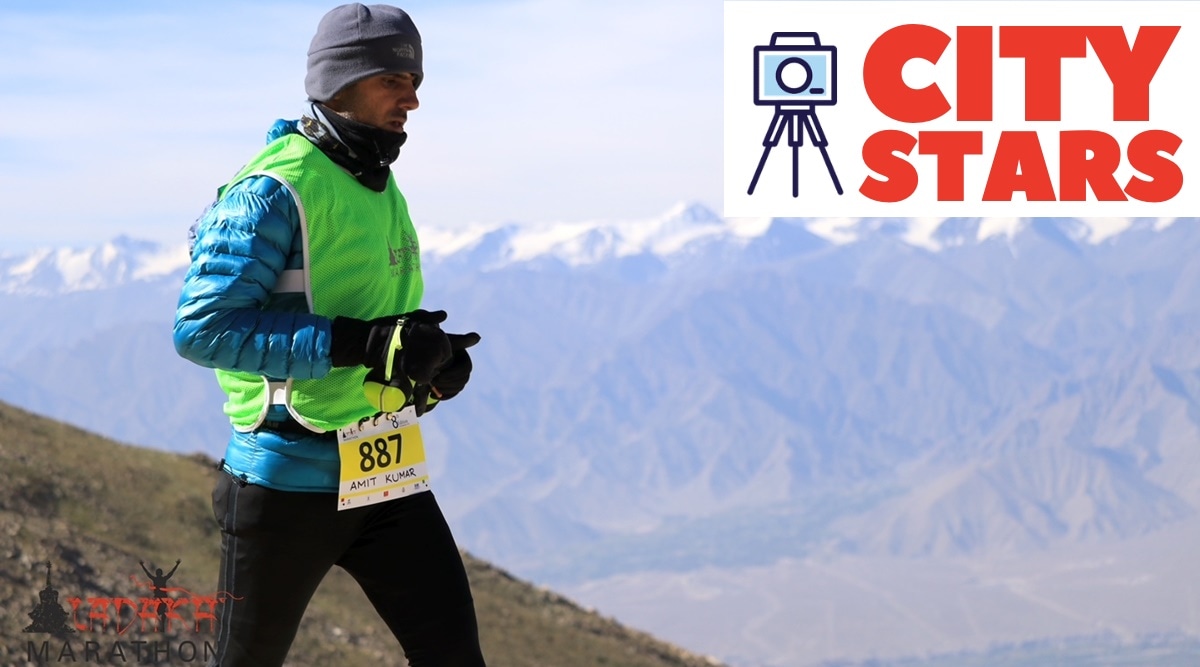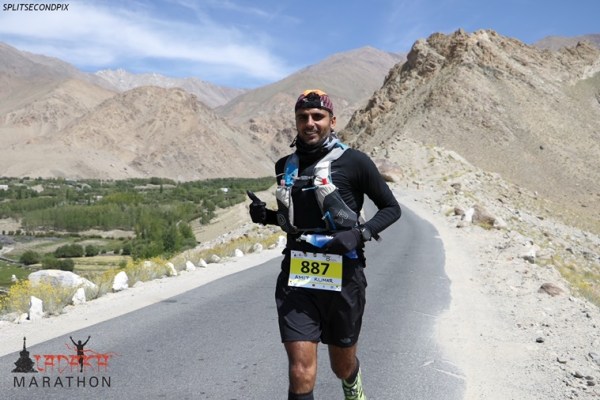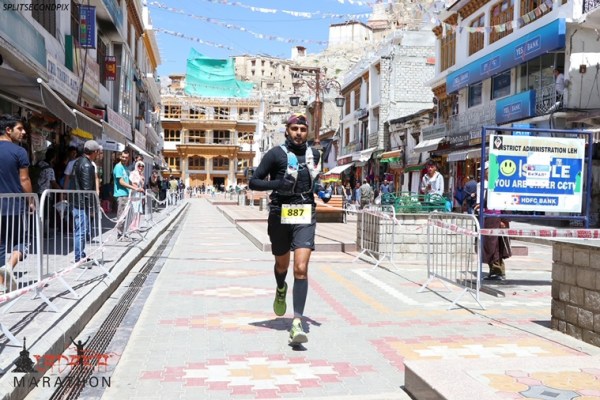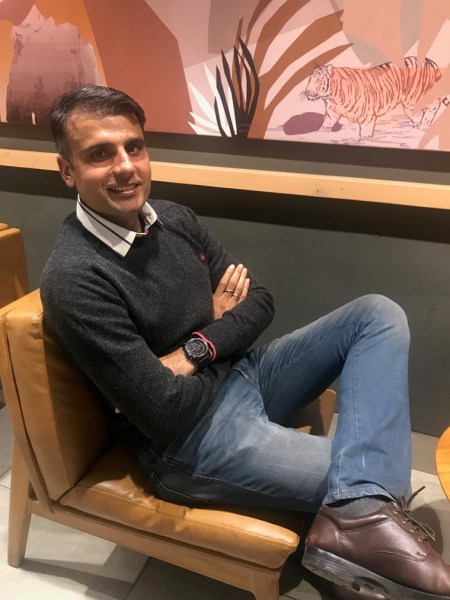 Ultramarathoner Amit Gulia | Express photo
Ultramarathoner Amit Gulia | Express photo From the golden city of Jaisalmer to the victorious battleground of Longewala in Rajasthan, the Border100 is the flattest 100 mile (161 km) run that salutes the memory of martyrs. Held in December, around Vijay Diwas, the route runs through the Great Thar, along sand dunes, ruins, and evacuated villages via Ramgarh.
On December 18, 2021, Gulia set a new 100 mile road national time at the ‘The Border 100 2021’. It was a twin celebration – the 50th year of victory of the Indian Army at the Longewala border and Gulia’s 17 hour 47 minutes, a new course record. He not only broke the national best of 18 hour 22 minutes held by Vikas Malik, but beat his own time of 19 hours 40 minutes set in 2018.
One of the many achievements of Gulia, the tall, athletic 38-year-old marathoner and ultramarathoner, in a ‘running commentary’, provides a marvelous lens to the sport, its eureka moments, the fascinating connections he made en route, adventures and memories, inspiring stories behind each route, and the unbelievable satisfaction and high a run unleashes.
The Starting Point: Hailing from a farming family in Meerut, Gulia never shied from physical activity, be it sweating it out in the fields or running around and playing sports. Fitness was a way of life.
 On December 18, 2021, Gulia set a new 100 mile road national time at the ‘The Border 100 2021’. | Express photo
On December 18, 2021, Gulia set a new 100 mile road national time at the ‘The Border 100 2021’. | Express photo “I love the pace of a simple life,” says Gulia, a pharmacovigilance scientist, who, after his post graduation in Microbiology moved to the quiet, picturesque town of Palampur in Himachal Pradesh to pursue research.
His increasing interest in the medical field saw him move to Chandigarh in 2008 to undertake a PhD in Medical Biotechnology from PGI, where he stayed till 2017 before joining IT company Parexcel here.
Barring the occasional weekend game of cricket, life at PGI was hectic, marked with stressful working hours, frustration over projects, erratic schedules. The pressure left Gulia with a sense of discontentment. Terribly unfit at a young age of 28, this he thought to himself, was no life.
He found himself at the starting line in 2014. Decathlon in Zirakpur was organising a run, and the lure of a free burger for breakfast saw Gulia and his pal register for it. Not only did he enjoy the run, Gulia struck a friendship with ‘Chandigarh Runners’, and envied their spirit and how effortlessly they covered the distance.
Chetan Wadhwa from the group kept pushing him to join their weekly runs at the Lake, and one Sunday, he finally did. “I thought I was fit till I huffed and puffed in the first mile. 50+ year olds were running with such ease, and it made me resolve to work and attempt at least half a marathon – 21 km,” says Gulia, who also took the challenge to lose weight along with it for his marriage that very year.
Running brought about discipline in him. The ‘jazba’ took over and Gulia went on to register for his first half marathon in January 2015 in Panchkula. He finished it in one hour and 47 minutes, noteworthy for a first event.
Motivated, he started training with runners regularly, adding distance, till he found himself covering 40 km, and more comfortably. It also saw Gulia forge another friendship – with fellow runner Dr Vishal Gupta, who spotted an ‘ultramarathoner’ potential in him.
Ultramarathons are footraces longer than the traditional marathon length of 42.195 km. Encouraged by him, Gulia registered for the 80 km category in the ultramarathon held in Delhi in 2016. Surrounded by experienced runners, an apprehensive Gulia chose to listen to his body, and finished in 9 hours 20 minutes as against the 14 hour limit. He came first.
The Mile Marker: Running can be addictive. Meditative. A beautiful habit. “When you run, things begin to settle. It brings discipline, unspools the tangles of mind, and becomes a part of you – the mind listens, the body adapts,” says Gulia.
 In 2016, Gulia won the Mashobra Ultra Tuffmen spanning 70 km in just 7 hours 40 minutes | Express photo
In 2016, Gulia won the Mashobra Ultra Tuffmen spanning 70 km in just 7 hours 40 minutes | Express photo Driven and determined, Gulia found himself reading more on strategy, training techniques, investing more time, money and energy into it. When you love something, you revolve your life around it. Gulia continued registering for events, and in 2016, won the Mashobra Ultra Tuffmen spanning 70 km in just 7 hours 40 minutes.
It was there that a meeting with runner Vijay Pandey, “an encyclopedia on running and nutrition”, changed his perspective. Recovery rate post a sporting event is crucial, and diet plays a key role in the process. “Vijay asked me to experiment with diet and watch.” Gulia went from a non-vegetarian to vegetarian and now a vegan diet, and saw phenomenal change in his running and recovery time. “Runners have acid reflux and acidity because of the energy gels they have to consume while running at a stretch. My recovery time during non-veg days was a week. I would be down with acidity and cramps. It reduced to a day when I switched to a vegan/vegetarian diet. It varies from body to body, one has to experiment.”
Shivalik Ultra, Shimla Ultra, Gharwal Runs, Salomon X-Trails Ultra, 24 hour stadium run in Bengaluru, Khardung La Challenge, 12 hour stadium run in Hyderabad, runs for social cause – Gulia’s been running on varying routes and elevation, breaking course records, and adding to his achievements.
“I am 38 now, but I have the same level of energy of a 20-year-old. Some people like to talk or listen to music, but I run alone. It’s my personal time,” says Gulia, an ardent follower of American ultramarathoner Scott Jurek.
The path to self-discovery can also be an expensive one. Gulia faced challenges when it came to finances – expenditure for event registration, accommodation, running gear, research, energy gels, diet, shoes that need to be changed every 15,000 km, clothes that don’t end up causing chaffing or rashes, and are climate friendly. “India has an amazing level of talent, and we can make it big if only runners get sponsors, financial help,” feels Gulia, who is now Leap Ambassador (energy gel for endurance sports) and ambassador for Brooks India (running shoe chain from USA).
The Highs & Lows: Revelations on the Run
Chosen to represent India at the 12th International Association of Ultra running (IAU) 24 Hour World Championships and WMA 24 Hour World Championship at Belfast, Ireland in July 2017, Gulia was heartbroken when his visa was rejected. However, he soon experienced a phenomenal high when he signed up for La Ultra 2017. This ultramarathon takes on over three 17,500 feet plus high mountain passes of Ladakh, from the base of the Karakoram Range in Nubra Valley to the mighty Indus river after crossing Khardung La (the highest motor-able road in the world). This cold desert is beautiful and brutal, and you can experience 40 degrees Celsius heat to -12 degrees Celsius cold in a matter of hours.
 Gulia hails from a farming family in Meerut | Express photo
Gulia hails from a farming family in Meerut | Express photo Low oxygen levels, high altitude, extreme temperature – Gulia acclimatized himself by reaching 15 days in advance, and walking daily up to Khardung La. Not many sign up for this event and most of the runners give up at the Khardung La pass for it’s a run that redefines human endurance. He registered for 222 km to be completed in 48 hours. Gulia finished in 36 hours, the first Indian to achieve it.
But perhaps the biggest blow was dealt at Spartathlon, a 246 km ultramarathon held annually in Greece from Athens to Sparti (ancient Sparta). It’s inspired from Pheidippides, who ran from Athens to Sparta for 36 hours to get aid against the Persians.
“It follows the same breathtaking route, through a vineyard, village, highway. Over 390 runners participated, and I was the only one from India.” Gulia trained hard for a very hot September run, but just before the marathon, a cyclone hit Greece, and Gulia found himself drenched, barely able to run on a cold, wet, rainy track.
“Even our bags left at rest spots were soaked,” says Gulia, who developed hypothermia, and had to quit at 141 km.” The marathon saw around 120 runners drop out that year. Depressed, Gulia lost his confidence, and was down, emotionally, financially.
A bout of Covid left his body exhausted, depleted of energy and stamina. “I lost weight, and was advised to refrain from physical activity to avoid pressure on the heart,” shares Gulia, who started slow, with a month of cycling first, and then short distance running…even five to six km seemed an eternity, and left him fatigued.
More than a physical challenge, long distance running is a mental conquest, a humbling experience, for when you run for hours together, you submit to it, and realise life is much bigger than trivialities. With support from his friend Vishwas Sidhu, Gulia attempted The Border100, and made course record. He will be applying again this year for Spartathlon, and is looking forward to the Badwater Event in California Death Valley. A riveting story this one; four prisoners who had escaped made a dash on this route, and only one survived. It’s one of the toughest foot races in the world, where your shoes get stuck in the melting tar on the road. Whoa!
Run, Tricity, Run: Did you know, women are better long distance runners than men? “They pace quite well in long distance,” Gulia says in reference to some studies, and gives a thumbs up to the growing tribe of women runners in the city.
As for the Tricity, Gulia wishes it would have more running/sports clubs, sponsors for sportspersons, awareness drives to promote health including walking, running, cycling, gymming etc. “Government, parents, schools have to promote healthy habits and sporting activities amongst kids so that the next generation is aware about health and fitness,” he says.
- The Indian Express website has been rated GREEN for its credibility and trustworthiness by Newsguard, a global service that rates news sources for their journalistic standards.

